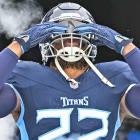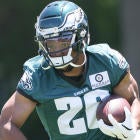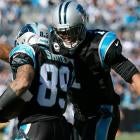
It was nearly 48 years ago when Bill Belichick and Don Shula first shared a field during an NFL football game. Belichick was in his first season as an NFL head coach while serving on Ted Marchibroda's staff with the Baltimore Colts. Shula was at the peak of his coaching powers while presiding over a Dolphins team that was two years removed from its second consecutive Super Bowl win.
No one knew it then, but the Colts' special assistant coach during Baltimore's 33-17 win on Nov. 10, 1975 would one day be in pursuit of Shula's all-time wins record. This past Sunday, Belichick joined Shula and George Halas as the only coaches with 300 regular-season wins. Belichick also moved to within 17 wins of Shula's record of 347 wins, including the playoffs.
With Belichick in pursuit of Shula's record, we decided to take a deeper look at both coach's careers while helping decipher how Belichick's career stacks up with the Dolphins' legend.
Belichick-Shula tale of the tape
| Belichick | Shula | |
|---|---|---|
| Seasons as a head coach | 29 | 33 |
| Franchises coached | 2 | 2 |
| Regular-season wins | 300 | 328 |
| Playoff wins | 31 | 19 |
| Regular-season winning percentage | .656 | .677 |
| Postseason winning percentage | .705 | .528 |
| Championships | 6 | 2 |
| Conference titles | 9 | 6 |
| Division titles | 17 | 16 |
| Playoff seasons | 19 | 19 |
| Winning seasons | 21 | 27 |
| Losing seasons | 7* | 2 |
*- not including this season's 2-5 start
Championships is the biggest difference between the two coaches. Belichick has three times as many titles as Shula, who it should be noted did win an NFL title as the Colts coach in 1968. Speaking of the '68 Colts, their 16-7 loss to the Jets in Super Bowl III served as Shula's most shocking defeat. The loss ultimately prevented him from becoming the first coach to lead multiple franchises to Super Bowl wins.
Belichick also has an edge as far as overall playoff success. Along with Super Bowl III, Shula's teams came up short in three other Super Bowls that included the team's lopsided loss to the Cowboys in Super Bowl VI. Shula's teams, however, often had to compete against other iconic teams in John Madden's Raiders, Chuck Noll's Steelers and Marv Levy's Bills. The Dolphins, like every AFC team in the '80s, also had the unenviable task of facing NFC powerhouses that included Bill Walsh's 49ers, Bill Parcells' Giants and Joe Gibbs' Washington squad.
Opponents notwithstanding, no coach presided over a longer sustained stretch of dominance than Belichick, whose Patriots qualified for the playoffs all but one time from 2001-19. Just as incredible is the fact that New England played in every AFC title game from 2011-18, winning five times.
Shula, though, remains the NFL's gold standard as far as sustained longevity. He went 8-6 in his first season as an NFL head coach in 1963, and was 9-7 in his final season on the sidelines in 1995. In between, Shula's teams made the playoffs on 27 other occasions. Shula's four losing seasons are a testament to his incredible consistent and ability to adapt to the times.
An example of Shula's coaching adjusting to different eras is his team's offensive philosophy in '72 vs. '84. His '72 team featured the NFL's first pair of 1,000-yard rushers in Larry Csonka and Mercury Morris. The '84 Dolphins were led by Dan Marino, who broke then-NFL single-season records with 5,084 yards and 48 touchdowns. Both teams advanced to that year's Super Bowl.
Both coaches are also synonymous with great defenses. Shula's "No Name" unit shut out Washington's offense in Super Bowl VII and allowed Fran Tarkenton and the Vikings offense to score just once in Super Bowl VIII. Belichick's early 2000s defense did a number on Peyton Manning and the Colts' prolific offense in back-to-back playoff matchups. Belichick also overlooked a historically great Giants defense during his successful run as New York's defensive coordinator that included two Super Bowl wins.
Shula and Belichick were also game-changers in their own ways. Shula was ahead of his team as far as offensive workouts. Belichick, who also serves as Patriots general manager, has been the most successful coach as far as adjusting to the salary cap era.
There are, however, two notable parts of Shula's career that are truly unique. He is the only person to coach an undefeated team (the '72) Dolphins, a feat Belichick came close to but ultimately just short of matching in 2007. Shula also led two different franchises to Super Bowls and went to the big game with four different starting quarterbacks. Conversely, each of Belichick's Super Bowl trips came with Tom Brady under center.
There's no denying Belichick's place in NFL history. He is the winningest coach as far as Super Bowls are concerned and he will likely surpass Shula in all-time wins sometime over the next two years. But in order to be definitively hailed as the greatest coach of all time, Belichick will likely need to do something he hasn't done since his third year with the Browns way back in 1994: win a playoff game without Brady, or at least make the playoffs again without the quarterback many have hailed as the greatest of all time.
If Belichick can do that, he would likely erase any doubt about his legacy and how it compares with Shula and the NFL's other coaching legends. Until that happens, though, one can make the argument that Shula is still the gold standard by which pro football coaches should be measured.






















